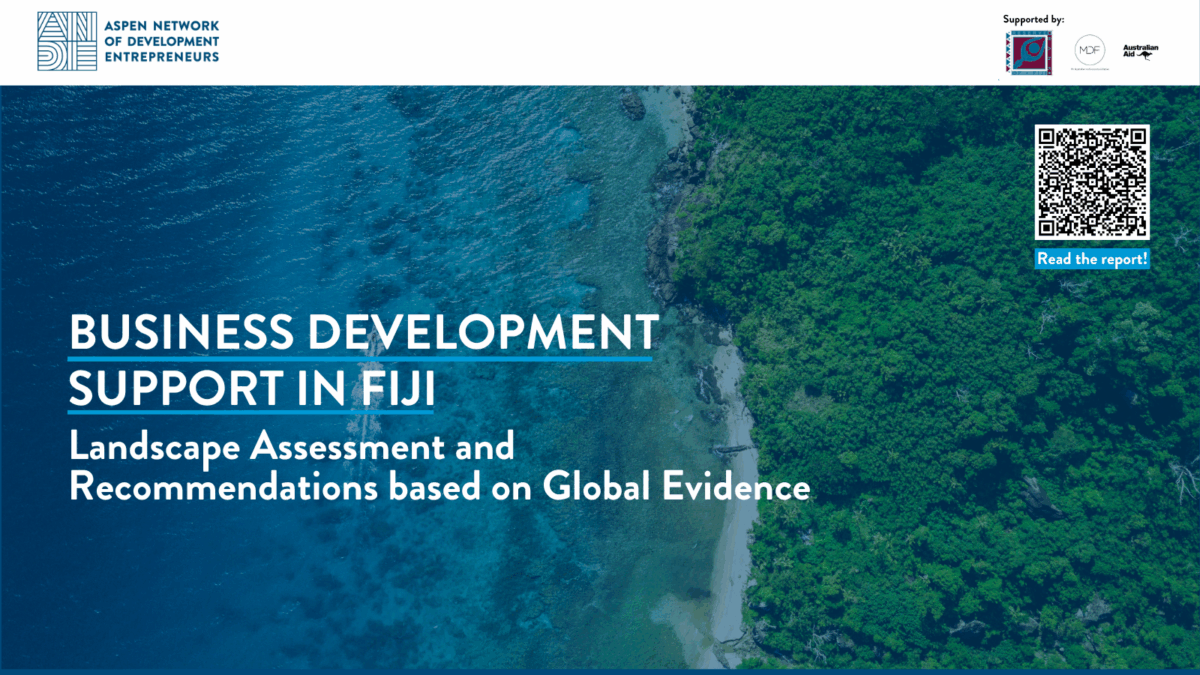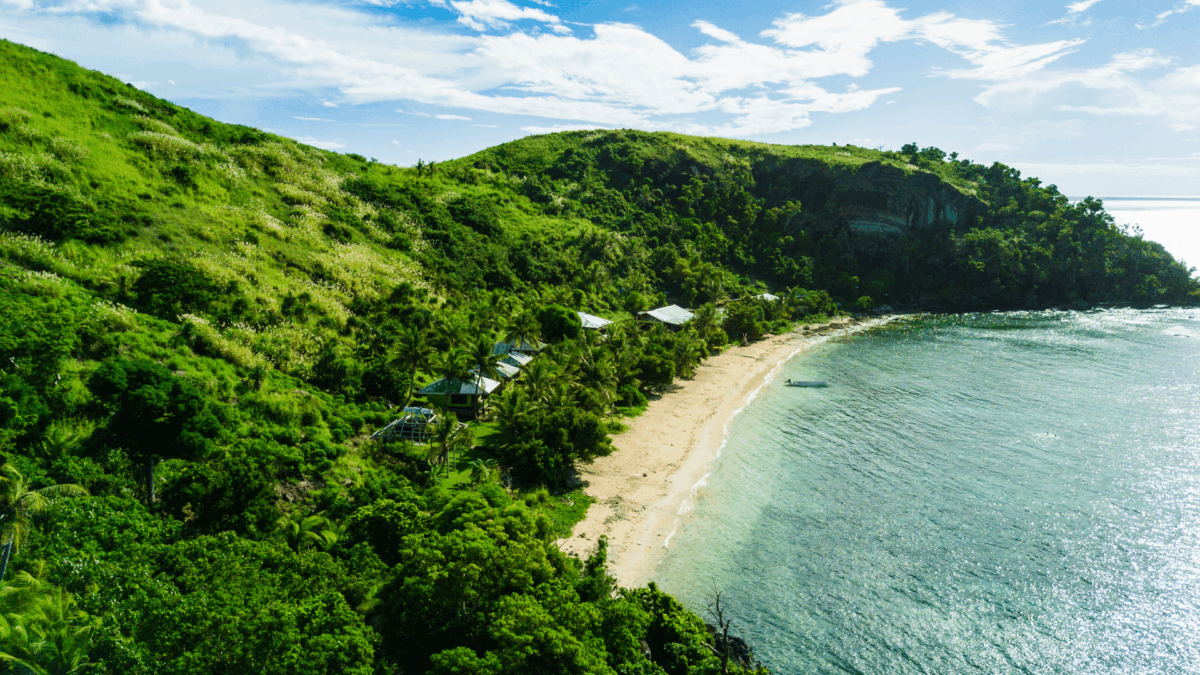
Fiji with its tropical beaches and vibrant culture is often seen as a top tourist destination. However, brewing underneath the sands of its pristine beaches is an entrepreneurial ecosystem that has the potential to be a game changer for Fiji’s economic development. ANDE’s most recent report – Business Development Support in Fiji: Landscape Assessment and Recommendations based on Global Evidence, highlights a cadre of business development service (BDS) providers specialized to support the needs of Fiji’s nascent start-up ecosystem. If nurtured strategically, Fiji’s ecosystem has the potential to derive both sustainable and inclusive growth in the country, standing as an exemplar in bottom-up private sector led growth in the Pacific region.
What is so promising about the Fijian ecosystem?

The second largest economy in the Pacific region, Fiji outpaced the rest of the region in post pandemic growth (Fiji’s 8 percent compared to regional average of 5.5 percent). More importantly, Fiji’s young population – over 36 percent – under the age of 20, positions the country to reap the benefits of its demographic dividend fueled by Fiji’s innovative youth.
Despite its relatively small population of 933,200, the country is home to 29,000 and counting MSMEs. Entrepreneurship is an integral part of everyday life in Fiji with 60 percent of all employment coming from MSMEs that contribute to 18 percent of the country’s GDP.
While these stats show a promising future for Fiji’s entrepreneurial landscape, the ecosystem also has the support of the country’s government, with MSMEs being a key priority in Fiji’s National Financial Inclusion Strategy 2022-2030. The government has shown commitment towards regulatory reform, and has shown interest in youth entrepreneurship and public-private partnerships in the MSME space through programs like MSME Fiji.
What are the key areas for growth for Fiji’s BDS landscape?
Despite the great potential, Fiji’s ecosystem is lacking in four key strategic areas:
- Expand BDS to rural areas: In a recent UN Survey conducted among 97 MSMEs in Fiji, only 19% of the sample said that they had used BDS programs in the past, with 60 percent of the MSME founders reporting that they did not have access to BDS. While this response could be cited to the lack of awareness, it can also be attributed to the small number of BDS providers that cater to the needs of enterprises outside of key metropolitan areas like Suva and Nadi. The lack of access can also be linked to the unreliable internet service that BDS providers underscored while asked about program online program delivery.
- Expand Sector Specific BDS in key industries: Three sectors, specifically – transport & storage, wholesale & retail, and agricultural sectors dominate the MSME landscape of Fiji. Combined, these sectors account for 43 percent of all MSMEs in Fiji. Similarly, tourism plays a significant role in the Fijian economy contributing to 40 percent of its GDP and 36 percent of the country’s employment directly or indirectly. Despite such high stakes in the economy and the MSME ecosystem, Fiji lacks specialized BDS programs that cater to the needs of entrepreneurs in these key sectors. While YGAP’s y-her accelerator provides support to entrepreneurs in the tourism industry and Seremaia Bai’s Agro-Rugby indicator provides some specialized support, more such programs are essential to offer proper support in key industries.
- Emphasize on collaboration within the Ecosystem: With over 20 BDS programs in Fiji, the challenge is not to create new programs, but retain the ones that already exist. Given the high dependence on international grant funding for BDS providers, programs fail to continue beyond grant cycles. Rather than depending solely on international donors, Fiji’s business ecosystem must contribute to support its startup ecosystem to ensure sustainability of the latter. Other than the need to collaborate with the private sector, collaboration between BDS providers is equally important. There are few pathways where ventures can ‘graduate’ from ideation stage to acceleration, or get access to financing opportunities once businesses have scaled. As a result, founders tend to jump from one program to another in hopes of securing funding opportunities rather than the need to learn, thus limiting opportunities for emerging entrepreneurs. Additionally the start-up ecosystem also needs to tap into actors like local universities for ideation to create a pipeline for high quality ventures.
- Apply evidence based frameworks considering local context: ANDE found that BDS providers in Fiji are moderately applying evidence based practices like Argidius Foundation’s SCALE Framework in their programs. Out of the five categories within the SCALE framework, we found high adaptation within categories – Selecting the right enterprises, and Learning by evaluating enterprise performance; moderate adaptation of Addressing problems, and Lead by example; and low adaptation of Charging entrepreneurs.
Notably, ANDE only found one program in the county – Fiji Enterprise Engine (FEE)- to be charging entrepreneurs for BDS service. While most organizations offer free of charge service to ensure more entrepreneurs can access their services, FEE’s unique model ensures that all entrepreneurs entering their program have some “skin in the game” and offer no funding at the end of their program so that only the ventures that are most motivated to learn how to scale up join. This focus on quality over quantity, and learning over funding makes FEE’s model stand out in the Fijian BDS landscape.
Although the SCALE principles are backed by meticulous research and practice, Fiji should learn to adapt the framework to the ecosystem rather than blindly adopting its principles. The ecosystem must consider the socio-cultural and economic contexts within its unique ecosystem before implementing these recommendations. Additionally, rather than sticking to one method of program delivery, BDS providers should have and explore the opportunity to pilot and evolve programs based on what works well for entrepreneurs in a particular region.
Despite the multitude of possibilities, the Fijian ecosystem has a long way to go before realizing its true potential. In doing so, policymakers, BDS providers, business leaders, and other stakeholders should try to find solutions that are conditioned to fit the specific needs of the country’s emerging ecosystem. Rather than focussing on the quantity of providers, the country must focus on retaining and strengthening the web of support entrepreneurs receive, while expanding to regions where BDS support is minimal to help trigger the multiplier effect that innovation and entrepreneurship can foster transformative growth.
